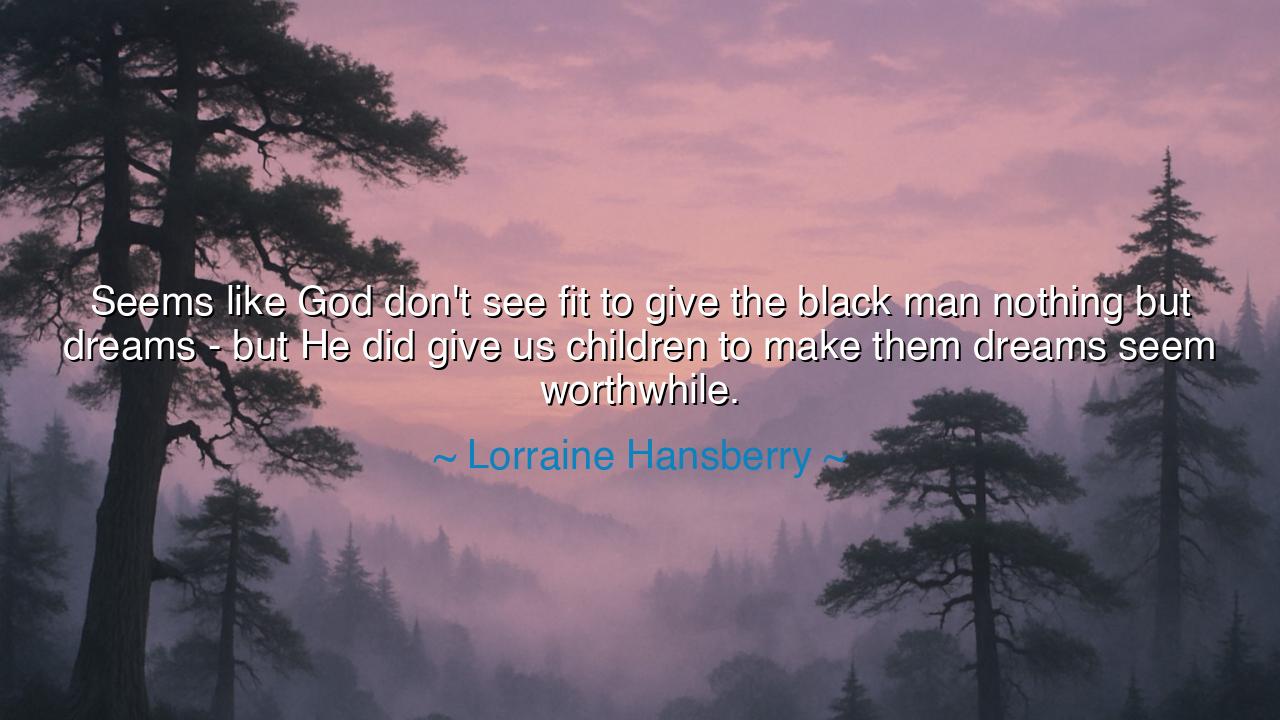
Seems like God don't see fit to give the black man nothing but
Seems like God don't see fit to give the black man nothing but dreams - but He did give us children to make them dreams seem worthwhile.






“Seems like God don’t see fit to give the black man nothing but dreams — but He did give us children to make them dreams seem worthwhile.” — Lorraine Hansberry
In these sorrowful yet luminous words, Lorraine Hansberry, the prophetic voice of a generation, gives voice to both suffering and hope, to despair and to redemption intertwined. Her words speak not only of one man’s burden, but of an entire people’s struggle — the black man, the forgotten dreamer of America, who has wrestled for centuries with a world that denied him peace, dignity, and equality. And yet, in the same breath, Hansberry reveals the quiet flame that has never gone out — the flame of dreams, and the light of children, who make the endurance of those dreams meaningful. In this single sentence, she gathers the tragedy of oppression and transforms it into the poetry of perseverance.
The origin of this quote is found in Hansberry’s immortal play, A Raisin in the Sun, first performed in 1959. It was the first play on Broadway written by a black woman, and through it, Hansberry brought the voices of African American families into the heart of American theater. The words are spoken by Walter Lee Younger, a man crushed between his ambitions and the walls that society has built around him. He longs for success, for wealth, for recognition — for a share in the American dream that others take for granted. Yet again and again, the world tells him no. In his bitterness, he laments that God seems to have given the black man nothing but dreams — dreams with no soil to grow in. But even in his sorrow, he finds a reason to go on: his children, the promise of a future where those dreams might yet take root.
Hansberry’s genius was to reveal that the dream, even when deferred, is sacred. The black man, denied justice and opportunity, was not left barren. He was given imagination — the divine power to see beyond suffering, to envision freedom when none was offered. That dream, Hansberry suggests, is both a curse and a gift: a curse because it burns within the heart without release, and a gift because it keeps the spirit alive when reality would crush it. The children become the vessel of that hope, the living proof that even in a world of denial, life continues, and with it, the stubborn will to believe in something better.
This struggle is not confined to a single era or people. History resounds with the same cry — that of those who are given little but the dream and the strength to pass it onward. Consider the life of Nelson Mandela, who spent twenty-seven years in prison for his dream of equality in South Africa. The world tried to take everything from him: freedom, comfort, even time itself. Yet he did not surrender his vision. His dream outlived his suffering, because it was carried not by him alone, but by the children of his nation, who were raised to believe in it. When he finally walked free, it was not as a man reclaiming what he had lost, but as a father stepping into the promise of his children’s future.
Hansberry’s words also reveal a sacred rhythm between despair and faith. The man who feels abandoned by God does not curse his Maker — he looks to his children and understands that perhaps God’s gift was not wealth or power, but continuance. The black man may have been denied much by the world, but he has been entrusted with something the world cannot touch: the ability to dream and to create life. His children are the evidence that the human spirit does not die — that each generation, though burdened, carries the seed of renewal. In this way, Hansberry’s quote becomes both lament and hymn: a mourning for what has been lost, and a quiet celebration of what endures.
For the wise listener, this quote holds a lesson not only about race, but about the nature of hope itself. Every soul, at some point, will feel that life has given them less than they deserve — that their labor is wasted, their dream unreachable. In those moments, Hansberry calls us to look to what is still ours: the people, the values, the small and radiant acts that keep meaning alive. To have children — literally or metaphorically — is to invest in the future, to believe that even if the world denies us now, it cannot forever deny those who come after us.
Thus, my children of tomorrow, remember the teaching of Lorraine Hansberry: even when the world strips you of power, it cannot strip you of dreams. And if the dream seems too heavy to bear alone, pass it on — to your children, to your students, to the next generation that will rise from your faith. For it is not wealth, nor ease, nor recognition that makes life worthwhile, but the act of planting seeds in a field you may never see in bloom. That is the divine work of humanity: to dream, to endure, and to love enough to keep hope alive.
So when the night grows long and the world seems cruel, think of Hansberry’s black man, dreaming under the weight of despair. Think of the children, sleeping nearby, unaware that their very breath is his redemption. Then rise, and keep dreaming. For even when the dream is deferred, it is never lost — it waits, alive and shining, in those who come after you.






AAdministratorAdministrator
Welcome, honored guests. Please leave a comment, we will respond soon